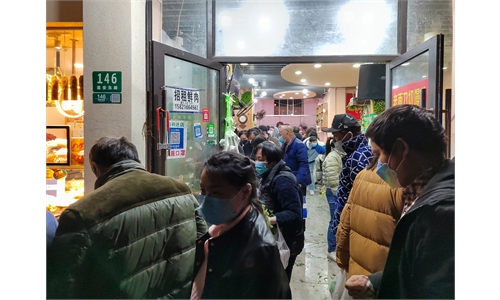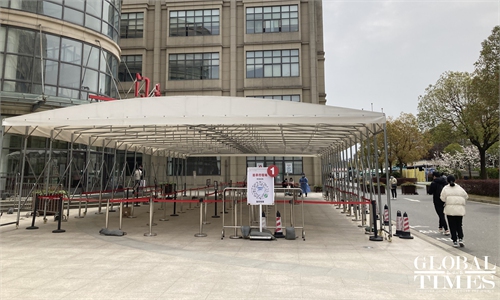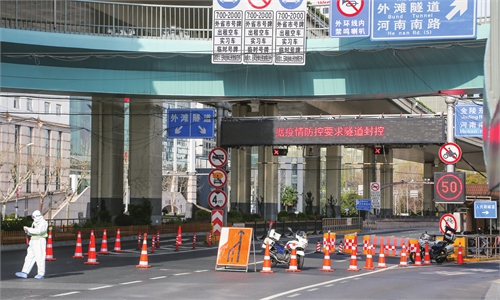Chipmakers in Shanghai race to minimize supply chain disruption amid closed-off management

Unmanned catering cars park outside the subway station of Zhangjiang Jinke Road in Shanghai, east China, Nov. 26, 2020. Photo:Xinhua
As China's financial center Shanghai, which is also an important semiconductor production base, implemented phased closed-off management measures to curb the COVID-19 outbreak, chipmakers have been racing to ensure supplies and maintain operations, in a bid to minimize the losses and potential impact on the global supply chains.
The city imposed closed-off management in the eastern part of the city, which is also home to major semiconductor labs, to carry out nucleic acid testing from 5 am Monday to 5 am Friday.
The phased closed-off management in Shanghai is expected to cause a short-term supply shortage of semiconductors, with prolonged production cycles for some products. But as companies are making every effort to maintain production, the impact on output nationwide will be limited, experts said.
Following the announcement of closed-off management, China's biggest chip producer SMIC, as well as Hua Hong Semiconductor and other semiconductor foundries, said their plants in Shanghai's Zhangjiang High-tech Park, which is in the eastern part of the city, will maintain normal operations to ensure the non-stop supply of semiconductors while working with local authorities to adhere to COVID-19 protocols.
Many chip companies in Shanghai's Zhangjiang High-tech Park are running under a closed-off procedure by having employees work and stay in the factory campus so as to ensure production, the Global Times learned.
An employee from a local navigation chip company in Zhangjiang said that several engineers have been living in the company for around two weeks, aiming to keep operations as normal as possible. "The company currently does not have that many projects, so we do not have significant issues with delivery," he said.
Zhangjiang High-tech Park, which is located in the Pudong New Area, is an integrated circuit industry highland in China. It has the most complete industry chain and the strongest independent innovation ability in China.
In 2020, the sales of the integrated circuit industry in Zhangjiang hit 180 billion yuan ($28.26 billion), accounting for 87 percent of the city and 20 percent of the country. The 2021 figure is yet to be disclosed.
Although major chip manufacturers have not halted production, their delivery periods are being extended, several companies in the sector told the Global Times.
From production to shipment, the semiconductor industry now faces more difficulties than in 2020, mostly due to the blocked logistics and the quarantine requirements, a worker at a millimeter-wave radar chip designing company told the Global Times on Tuesday.
"The delivery period from the fabs is extended. Since most of the employees in our company are working at home, shipments from the company's warehouse have been suspended for two weeks," he said. "To minimize the impact, we are striving to arrange shipments based on priority and urgently concetrating all resources."
This round of closed-off management has had a certain impact on business, a staff member at a Shanghai-based semiconductor research and development company told the Global Times on Tuesday. "The production is fine. However, as the overall logistics are blocked, shipments to customers are often delayed due to the epidemic," the staffer said.
The downstream industry has also felt the impact of the chip shortage.
A staff member at a downstream heavy industry foreign enterprise based in Zhangjiang told the Global Times on Tuesday that her company has been facing a chip shortage, leading the product delivery time to extend to as long as six months, while the prices of some materials have surged.
She noted that her company has been actively seeking substitutes to maintain production, adding however that the prices of substitutes are high, as the purchases are only for the short term.
Gao Shiwang, a director with the China Chamber of Commerce for Import and Export of Machinery and Electronic Products, told the Global Times on Tuesday that short-term supply disruptions may have repercussions on production, prolonging the production cycle for certain products, though such impacts are partially offset by semiconductor manufacturers' emergency plans to have employees live inside factories or production complexes.
"All told, smaller companies are more on the receiving end of such an impact, while bigger manufacturers fare better. It also should be noted that a global contraction in demand will ease any supply crunch. The effects will not be apparent," Gao said.
Gao noted that even when the epidemic was at its worst, semiconductor production was not altogether halted, and the pain point would be in logistics, the transportation of production materials.



